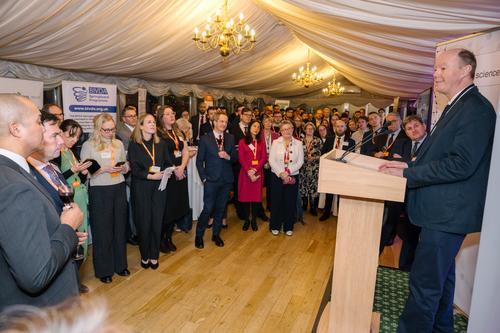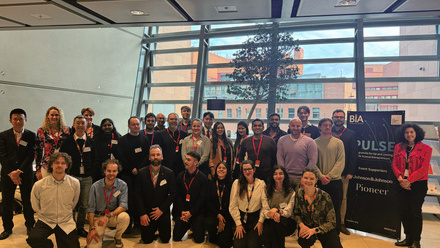CEO Update - 17 February 2025
Attendees were treated to hands-on demonstrations of cutting-edge research projects such as genomic technologies, advanced prosthetics, 3D bioprinting, and AI-powered medical devices. This event outlined how charities, academia, and industry are working together to deliver innovations that benefit both NHS patients and the UK economy.
Tackling health challenges: the Jawdrop Summit
Last week, I had the privilege of attending the Jawdrop Summit dinner at Imperial College, an event which exemplified the power of cross-sector energy. Centred on "From Gut to Brain – Tackling Obesity, Dementia, and Beyond’, the summit brought together world-leading experts, pioneering companies, and visionary investors to explore cutting-edge science that is reshaping health outcomes. The dinner provided a fantastic opportunity to connect with leaders from across industry, academia, healthcare, and investment. It was inspiring to see such a collaborative spirit as we work together to address some of the most pressing health challenges of our time.
Welcoming Ashley Dalton MP: a new voice for public health
I’m pleased to welcome Ashley Dalton MP as the new Parliamentary Under-Secretary of State for Public Health and Prevention. Her personal experience with cancer—as both a survivor and carer—brings a deeply empathetic perspective to this role. Her focus on early diagnosis aligns closely with our industry’s goals. I look forward to collaborating with Minister Dalton to advance the UK’s life sciences agenda and strengthen our global leadership in medical innovation.
Clinical trials reform: a milestone for the sector
The House of Lords were debating the introduction of the Medicines for Human Use (Clinical Trials) (Amendment) Regulations 2024, which marks the most significant reform of clinical trials regulation in over two decades. These changes aim to streamline processes, embrace risk-proportionate regulation, and enhance transparency in trial registration and result publication. By aligning with international standards and offering competitive approval timelines, these reforms position the UK as an even more attractive destination for multinational clinical trials—accelerating innovation while improving patient outcomes.
Progress with the MHRA: supporting innovation
Last week’s meeting with MHRA Chair Professor Anthony Harnden and his leadership team provided valuable insights into their priorities. We discussed progress on clearing backlogs in clinical trial authorisations and implementing new legislation. The MHRA also shared updates on their Real-World Evidence Scientific Dialogue Programme (open for expressions of interest until April 4) and their seven new Centres of Excellence for Regulatory Science and Innovation. These initiatives show their commitment to supporting patient access to innovation through timely regulatory processes.
Genomics England: transforming healthcare through precision medicine
The Genomics England parliamentary reception at the House of Lords was another highlight this week. Hosted by Baroness Blackwood, it featured speakers such as Life Sciences Minister Baroness Gillian Merron and Genomics England CEO Richard Scott. The event emphasized genomics’ transformative potential for healthcare—enabling precision medicine that can revolutionize patient outcomes across the UK. We look forward to continuing our collaboration with Genomics England to deliver on this ambitious vision.
Navigating North America’s evolving IP landscape
Last week, members of BIA’s policy team met with Kayleigh Nauman, North American Intellectual Property Attaché and Policy Advisor at the British Embassy. This discussion illuminated significant shifts in North America’s IP landscape under Trump’s second presidency. While his first term was relatively positive for IP, new dynamics—including Elon Musk’s influence—may introduce challenges. Funding cuts at agencies like USPTO have led to delays in patent applications due to hiring freezes and staff reductions. These developments could present an opportunity for the UK to communicate its capabilities as a stable leader in IP protection.
Concerns were also raised about Trump’s scepticism toward multilateral agreements, which could leave organizations like WIPO without strong US engagement. This places greater responsibility on countries like the UK to uphold high IP standards globally—particularly in areas like AI and green technology. As ever, our ability to provide practical evidence of how robust IP frameworks drive innovation will be key.
Advancing cancer care and drug discovery with AI innovation
I was pleased to see the news that the UK government announced a significant boost for British cancer care and drug discovery through its backing of AI-driven companies. These innovative firms are set to drastically alter and improve early cancer detection and accelerate the development of groundbreaking treatments. By harnessing the power of artificial intelligence, these companies aim to transform patient outcomes while cementing the UK’s position as a global leader in life sciences innovation. This initiative evinces the vital role of cutting-edge technology in tackling some of the most pressing healthcare challenges of our time.
Looking ahead: collaboration amid complexity
The challenges we face—whether addressing global health crises or navigating shifting political landscapes—require resilience, collaboration, and leadership. The UK remains well-positioned to lead by example, leveraging its strong regulatory frameworks, innovative industry base, and diplomatic relationships. Together with our partners across academia, government, and industry, we will continue championing life sciences innovation that benefits patients worldwide.








